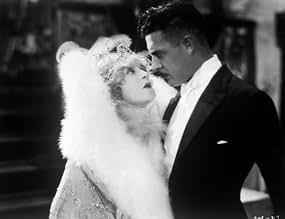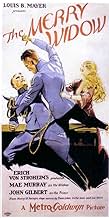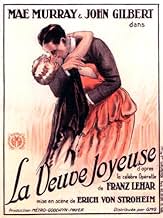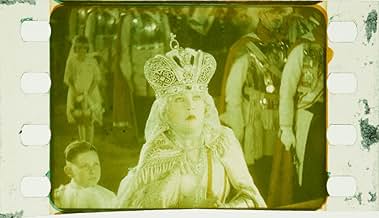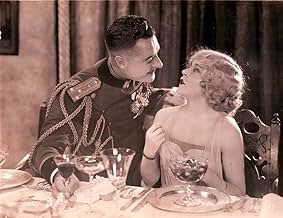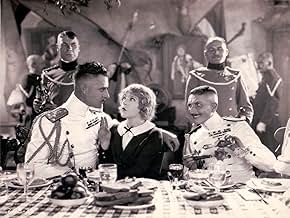IMDb-BEWERTUNG
7,2/10
2701
IHRE BEWERTUNG
Ein Prinz muss die reiche Tänzerin umwerben, die er einst im Stich gelassen hat. um ihr Geld im Land zu behalten, damit es nicht wirtschaftlich zusammenbricht.Ein Prinz muss die reiche Tänzerin umwerben, die er einst im Stich gelassen hat. um ihr Geld im Land zu behalten, damit es nicht wirtschaftlich zusammenbricht.Ein Prinz muss die reiche Tänzerin umwerben, die er einst im Stich gelassen hat. um ihr Geld im Land zu behalten, damit es nicht wirtschaftlich zusammenbricht.
- Auszeichnungen
- 3 wins total
Gertrude Bennett
- Hard-Boiled Virginia
- (Nicht genannt)
Bernard Berger
- Boy
- (Nicht genannt)
Sidney Bracey
- Danilo's Footman
- (Nicht genannt)
Estelle Clark
- French Barber
- (Nicht genannt)
Albert Conti
- Danilo's Adjutant
- (Nicht genannt)
D'Arcy Corrigan
- Horatio
- (Nicht genannt)
Joan Crawford
- Ballroom Dancer
- (Nicht genannt)
Xavier Cugat
- Orchestra Leader
- (Nicht genannt)
Anielka Elter
- Blindfolded Musician
- (Nicht genannt)
Dale Fuller
- Sadoja's Chambermaid
- (Nicht genannt)
Clark Gable
- Ballroom Dancer
- (Nicht genannt)
Empfohlene Bewertungen
A romantic Prince from tiny Monteblanco attempts to woo THE MERRY WIDOW who once loved him when she was a poor dancer.
Erich von Stroheim, the Teutonic genius who marched through Hollywood's Silent Days like a conquering general, had his final directorial stint at MGM Studios producing this lavish & brilliant film based on the operetta by Franz Lehár. The visuals are striking, with sets that look like actual locations--a mountaintop village; the Castellano Cathedral; Maxim's in Paris--and the occasional bizarre touch--the blindfolded musicians sharing the Prince's seduction bed, for example--which von Stroheim relished. The acting is flawless, with no need for dialogue. The actors' faces speak all that need be said.
Mae Murray & John Gilbert portray the passionate lovers whom Fate (and the plot) contrives to keep apart so successfully. Miss Murray (she and the director loathed each other) powerfully portrays a street-wise performer who, through a series of heartbreaks, becomes a vastly wealthy woman. Gilbert expertly plays a prince whose charm has always gotten him his way. Their scenes together, most particularly the waltz sequences, fairly blaze with unrequited sensual longing and desire.
While it is entertaining to wonder what von Stroheim would have done with the role, it is difficult to imagine anyone better than Roy D'Arcy as the simpering, lusting, sneering Crown Prince; he is pure villainy personified and his eventual fate is absolutely justified. Josephine Crowell gives a fine performance as the Queen. Tully Marshall, one of von Stroheim's favorite character actors, adds another portrait to his gallery of grotesques, this time playing a crippled baron with a foot fetish.
The wonderful organ score which accompanies the film was arranged & performed by Dennis James.
MGM would tackle THE MERRY WIDOW again nine years later and produce a vastly different film, this time directed by Ernst Lubitsch and starring Maurice Chevalier & Jeanette MacDonald.
Erich von Stroheim, the Teutonic genius who marched through Hollywood's Silent Days like a conquering general, had his final directorial stint at MGM Studios producing this lavish & brilliant film based on the operetta by Franz Lehár. The visuals are striking, with sets that look like actual locations--a mountaintop village; the Castellano Cathedral; Maxim's in Paris--and the occasional bizarre touch--the blindfolded musicians sharing the Prince's seduction bed, for example--which von Stroheim relished. The acting is flawless, with no need for dialogue. The actors' faces speak all that need be said.
Mae Murray & John Gilbert portray the passionate lovers whom Fate (and the plot) contrives to keep apart so successfully. Miss Murray (she and the director loathed each other) powerfully portrays a street-wise performer who, through a series of heartbreaks, becomes a vastly wealthy woman. Gilbert expertly plays a prince whose charm has always gotten him his way. Their scenes together, most particularly the waltz sequences, fairly blaze with unrequited sensual longing and desire.
While it is entertaining to wonder what von Stroheim would have done with the role, it is difficult to imagine anyone better than Roy D'Arcy as the simpering, lusting, sneering Crown Prince; he is pure villainy personified and his eventual fate is absolutely justified. Josephine Crowell gives a fine performance as the Queen. Tully Marshall, one of von Stroheim's favorite character actors, adds another portrait to his gallery of grotesques, this time playing a crippled baron with a foot fetish.
The wonderful organ score which accompanies the film was arranged & performed by Dennis James.
MGM would tackle THE MERRY WIDOW again nine years later and produce a vastly different film, this time directed by Ernst Lubitsch and starring Maurice Chevalier & Jeanette MacDonald.
Erich von Stroheim has played a neat little trick with 'The Merry Widow'. The first half of the movie plays out like a quirky royal-romance comedy. There are plenty of scenes and gags that could belong to the best comedic works of Howard Hawks. In the second half, the tone changes into more melodramatic, yet the tonal change doesn't take the viewer out of the movie. It actually gives that perfect feel of a mental hangover after the pure love has been ripped into shreds by the cruel world. But the whole film has some sinister undertone - like something is about to happen, but you can't be sure, what it is. Von Stroheim constantly leads his viewers somewhere, allows them to guess, and then - BAM.
John Gilbert is likable as charming Prince Danilo. Mae Murray balances between hammy and sometimes very good performance (someone said, that von Stroheim made actress out from Murray). But Roy D'Arcy is hamming his Crown Prince Mirko up. In a good way. His portrayal of a monocle-wearing sleazy villain blows all previous Erich von Stroheim's performances out of the water.
Like any other von Stroheim's movie, 'The Merry Widow' also suffered from studio interference (some scenes that were cut were quite steamy, probably even for today's standards). I would want to say that 'The Merry Widow' is von Stroheim's weakest work, but again, we can't see his whole vision. The sets are beautiful. Camerawork and editing also something of their own league. Again, you have to admire von Stroheim's attention to small details - lecherous Baron Sadoja's obsession with women's legs, who himself has sick legs.
John Gilbert is likable as charming Prince Danilo. Mae Murray balances between hammy and sometimes very good performance (someone said, that von Stroheim made actress out from Murray). But Roy D'Arcy is hamming his Crown Prince Mirko up. In a good way. His portrayal of a monocle-wearing sleazy villain blows all previous Erich von Stroheim's performances out of the water.
Like any other von Stroheim's movie, 'The Merry Widow' also suffered from studio interference (some scenes that were cut were quite steamy, probably even for today's standards). I would want to say that 'The Merry Widow' is von Stroheim's weakest work, but again, we can't see his whole vision. The sets are beautiful. Camerawork and editing also something of their own league. Again, you have to admire von Stroheim's attention to small details - lecherous Baron Sadoja's obsession with women's legs, who himself has sick legs.
10AnnieP
So much has been written about this picture that it is impossible not to see Von Stroheim's strange genius in it. I, for one, was brought up too conventionally to appreciate the recurring shots of feet - dancing, jumping, caressing, kicking - but it didn't get in the way of the story. It all takes place in their eyes - Mae Murray and the wonderful John Gilbert, so beautifully paired. The sparks fly, the seduction scene with the two blindfolded musicians sets the scene, and when he would seduce her...she cries, and he falls in love.
The responsibility of royalty and the greed of nations come between the lovers, but they come together again, and in the dance all is resurrected. A war of wills, of mistaken feelings and misunderstanding is what they talk about while their bodies move as one. I can hear the music still, see them, his incredible dark eyes riveted on her in all moods:successively amused, then tittilated, finally adoring, hungry; bereft, angry, and finally - consumed and satisfied.
It's a lovely film, even with the feet, and John Gilbert gives a wonderful performance. Mae Murray, who could cry for her own purposes and succumb when every woman in the audience was hoping for their union, was his match.
It's more than big, glorious MGM - it's a good story with strong characters. See it - on the big screen if you can, but see it in any case.!
The responsibility of royalty and the greed of nations come between the lovers, but they come together again, and in the dance all is resurrected. A war of wills, of mistaken feelings and misunderstanding is what they talk about while their bodies move as one. I can hear the music still, see them, his incredible dark eyes riveted on her in all moods:successively amused, then tittilated, finally adoring, hungry; bereft, angry, and finally - consumed and satisfied.
It's a lovely film, even with the feet, and John Gilbert gives a wonderful performance. Mae Murray, who could cry for her own purposes and succumb when every woman in the audience was hoping for their union, was his match.
It's more than big, glorious MGM - it's a good story with strong characters. See it - on the big screen if you can, but see it in any case.!
This is Cheshire, reporting from the 2004 Sydney Film Festival, where Erich von Stroheim's Merry Widow was just given a resounding hurrah! It was the darling of the festival! Never have i heard such hooping and cheering. Our enjoyment of the film was no doubt enhanced by the wonderful print and live piano, violin and brass accompaniment we were treated to.
I know Stroheim only went to Hollywood because he wanted to inject a bit of reality into the movies - and i think he did that superbly with Greed and those pictures before it. But the thing i loved most about Foolish Wives, for instance, my favourite Stroheim film so far (keeping in mind i'm yet to see Blind Husbands), was not how natural and real its performances were, though this was incredible, but Stroheim's wickedly subversive sense of humour. Foolish Wives is divine black comedy - and Merry Widow continues that tradition, not Stroheim's dream of realism. I can't believe Stroheim was depressed at how successful this film was, because he abandoned any attempts at "realism" to make it.
I think he achieves something better. I'm not one of these fellows who insists a picture hold a mirror up to reality to be good - if i was interested in reality, i'd watch a documentary, or perhaps sit on a park bench and watch the thing itself! I go to the pictures to see a different world, with a reality all its own. Its why i love the work of Fellini, the Coen Brothers, David Lynch, Wes Anderson, Kubrick and Co. They give us something better than reality! I think that's what Stroheim does here, and despite the fact that he didn't respect what he did, I think its among his greatest achievements. For modern audiences, The Merry Widow is one of the most delightful pieces of black salacious comedy available before the last twenty years (along with Bunuel's priceless L'Age D'Or). Such intelligent, aware humour - we all had a great laugh at the State Theatre in Sydney.
John Gilbert looks marvelous on screen, and MY what a fantastic actor he was. But the show is all but stolen by Roy D'Arcy, as Stroheim's beloved evil cousin figure. His salacious grin is a thing to behold. He cracked the audience up throughout. Seems D'Arcy is a great unsung hero of the cinema, from looking at his credits list. Perhaps a rediscovery of La Boheme and Bardleys the Magnificent might rejuvenate his memory, not to mention a beautiful DVD edition of The Merry Widow... or even a VHS edition! Who are we kidding here, guys! This is not only one of the most enjoyable silent films i've ever seen, its just a darn tootin' good comedy!
For all the talk of the "boundless shots of shoes" i'd heard were in this movie, i was expecting it to be a two-hour long shoe-store commercial. Whoever went on like that about this movie, including Irving Thalberg, must SO not have even heard of foot fettishism. Its so obvious when you see the picture. There are probably six shots of shoes in the picture total (!), and four of them are to illustrate one of the B-characters as a foot fetishist, which is fairly obvious, since he licks his lips and virtually salivates when he looks at feet! This is also ironic for this character, because his feet are the location of his disability: he walks with comic difficulty on two replacement feet, crutches. The remaining shoe shots are part of a delightful scene involving a game of footsies, which i won't spoil for you, but they are most certainly justified by the narrative.
Look, this is the sort of film i'd love to have on a pretty DVD edition (attention Kino!) as part of the wonderful Erich von Stroheim Collection sitting next to my bed so i can watch it to send me off onto a nice sleep. Its the most fun of Stroheim's films, but he in no way sells out, in my opinion. The humour is satirical, subversive "let's see what i can get away with" comedy - a treat!
For the record, i recommend to you in this order:
1. Foolish Wives 2. The Merry Widow (when its released some time soon, or at a film festival near you) 3. Greed 4. The Wedding March 5. Queen Kelly
(the only other surviving Stroheim picture i'm yet to see is Blind Husbands, and he only directed some scenes from Merry-Go-Round, which you can see on the doco The Man You Love to Hate - they're pretty great!)
I know Stroheim only went to Hollywood because he wanted to inject a bit of reality into the movies - and i think he did that superbly with Greed and those pictures before it. But the thing i loved most about Foolish Wives, for instance, my favourite Stroheim film so far (keeping in mind i'm yet to see Blind Husbands), was not how natural and real its performances were, though this was incredible, but Stroheim's wickedly subversive sense of humour. Foolish Wives is divine black comedy - and Merry Widow continues that tradition, not Stroheim's dream of realism. I can't believe Stroheim was depressed at how successful this film was, because he abandoned any attempts at "realism" to make it.
I think he achieves something better. I'm not one of these fellows who insists a picture hold a mirror up to reality to be good - if i was interested in reality, i'd watch a documentary, or perhaps sit on a park bench and watch the thing itself! I go to the pictures to see a different world, with a reality all its own. Its why i love the work of Fellini, the Coen Brothers, David Lynch, Wes Anderson, Kubrick and Co. They give us something better than reality! I think that's what Stroheim does here, and despite the fact that he didn't respect what he did, I think its among his greatest achievements. For modern audiences, The Merry Widow is one of the most delightful pieces of black salacious comedy available before the last twenty years (along with Bunuel's priceless L'Age D'Or). Such intelligent, aware humour - we all had a great laugh at the State Theatre in Sydney.
John Gilbert looks marvelous on screen, and MY what a fantastic actor he was. But the show is all but stolen by Roy D'Arcy, as Stroheim's beloved evil cousin figure. His salacious grin is a thing to behold. He cracked the audience up throughout. Seems D'Arcy is a great unsung hero of the cinema, from looking at his credits list. Perhaps a rediscovery of La Boheme and Bardleys the Magnificent might rejuvenate his memory, not to mention a beautiful DVD edition of The Merry Widow... or even a VHS edition! Who are we kidding here, guys! This is not only one of the most enjoyable silent films i've ever seen, its just a darn tootin' good comedy!
For all the talk of the "boundless shots of shoes" i'd heard were in this movie, i was expecting it to be a two-hour long shoe-store commercial. Whoever went on like that about this movie, including Irving Thalberg, must SO not have even heard of foot fettishism. Its so obvious when you see the picture. There are probably six shots of shoes in the picture total (!), and four of them are to illustrate one of the B-characters as a foot fetishist, which is fairly obvious, since he licks his lips and virtually salivates when he looks at feet! This is also ironic for this character, because his feet are the location of his disability: he walks with comic difficulty on two replacement feet, crutches. The remaining shoe shots are part of a delightful scene involving a game of footsies, which i won't spoil for you, but they are most certainly justified by the narrative.
Look, this is the sort of film i'd love to have on a pretty DVD edition (attention Kino!) as part of the wonderful Erich von Stroheim Collection sitting next to my bed so i can watch it to send me off onto a nice sleep. Its the most fun of Stroheim's films, but he in no way sells out, in my opinion. The humour is satirical, subversive "let's see what i can get away with" comedy - a treat!
For the record, i recommend to you in this order:
1. Foolish Wives 2. The Merry Widow (when its released some time soon, or at a film festival near you) 3. Greed 4. The Wedding March 5. Queen Kelly
(the only other surviving Stroheim picture i'm yet to see is Blind Husbands, and he only directed some scenes from Merry-Go-Round, which you can see on the doco The Man You Love to Hate - they're pretty great!)
The Merry Widow was first seen by American audiences on Broadway during the 1907-08 season where it ran for 416 performances. For those of us who know it primarily from the sound films with first Maurice Chevalier and Jeanette MacDonald and later Fernando Lamas and Lana Turner, this version will be quite interesting. Let's just say that what was put in the talkies was a lot closer to the stage production. Erich Von Stroheim who directed this film added quite a bit to the story. In fact in the end it isn't quite so merry.
Most of the film is taken up with just how Mae Murray became The Merry Widow. She's an American dancer who is stranded in the remote Balkan kingdom of Monteblanco which is ruled by King George Fawcett. In line for the throne is the rakish Roy D'Arcy, a Snidely Whiplash villain if there ever was one. Behind him is his cousin John Gilbert playing Prince Danilo.
Murray comes to the attention of both men, Gilbert actually falls for her, D'Arcy would like an occasional roll in the hay, but marry her? There's a third guy out there in Tully Marshall who is the wealthiest man in the kingdom and it's principal banker. He leaves and the whole place goes into receivership. Marshall's an old dude with some alternative sexual interests that Von Stroheim exploits to the fullest on screen and he'd like a young trophy wife and Murray fills the bill.
She does become a wife ever so briefly and then of course the Merry Widow having had her fill of royalty. But now that she holds the Monteblanco purse strings, D'Arcy has taken a renewed interest in her and maybe she just might be a suitable queen.
I think you can see where this is going though Von Stroheim does tease us a bit with some possible alternatives before the film concludes. The audience of 1925 saw one lavish production that nearly broke the new Metro-Goldwyn studio. We only see about half the footage he shot if that.
One thing that Metro did not have to worry about was a soundtrack. The music of The Merry Widow was very familiar to the American public and it's played on the organ throughout the film. Young contract players Joan Crawford and Clark Gable are extras in the ballroom scene and good luck in spotting them. Although in the Citadel film series book on The Films Of Clark Gable there is a still from The Merry Widow where Gable is pointed out.
I'm sure John Gilbert little dreamed that in six years Gable would be supplanting him as the number one leading man at MGM. But in The Merry Widow he's a stalwart and resolute Danilo and Mae Murray actually does suggest a bit of what Jeanette MacDonald's performance would be in the first sound remake.
In the fate of what happens to D'Arcy's character, Von Stroheim opts for some realism in terms of the European scene of the past 25 years or so before the film debuted. In fact very little of the happy tone of The Merry Widow is preserved here. The film given how Murray got her millions ought to be retitled, The Trophy Widow.
Still it's an interesting alternative to the normal operetta productions we're used to seeing.
Most of the film is taken up with just how Mae Murray became The Merry Widow. She's an American dancer who is stranded in the remote Balkan kingdom of Monteblanco which is ruled by King George Fawcett. In line for the throne is the rakish Roy D'Arcy, a Snidely Whiplash villain if there ever was one. Behind him is his cousin John Gilbert playing Prince Danilo.
Murray comes to the attention of both men, Gilbert actually falls for her, D'Arcy would like an occasional roll in the hay, but marry her? There's a third guy out there in Tully Marshall who is the wealthiest man in the kingdom and it's principal banker. He leaves and the whole place goes into receivership. Marshall's an old dude with some alternative sexual interests that Von Stroheim exploits to the fullest on screen and he'd like a young trophy wife and Murray fills the bill.
She does become a wife ever so briefly and then of course the Merry Widow having had her fill of royalty. But now that she holds the Monteblanco purse strings, D'Arcy has taken a renewed interest in her and maybe she just might be a suitable queen.
I think you can see where this is going though Von Stroheim does tease us a bit with some possible alternatives before the film concludes. The audience of 1925 saw one lavish production that nearly broke the new Metro-Goldwyn studio. We only see about half the footage he shot if that.
One thing that Metro did not have to worry about was a soundtrack. The music of The Merry Widow was very familiar to the American public and it's played on the organ throughout the film. Young contract players Joan Crawford and Clark Gable are extras in the ballroom scene and good luck in spotting them. Although in the Citadel film series book on The Films Of Clark Gable there is a still from The Merry Widow where Gable is pointed out.
I'm sure John Gilbert little dreamed that in six years Gable would be supplanting him as the number one leading man at MGM. But in The Merry Widow he's a stalwart and resolute Danilo and Mae Murray actually does suggest a bit of what Jeanette MacDonald's performance would be in the first sound remake.
In the fate of what happens to D'Arcy's character, Von Stroheim opts for some realism in terms of the European scene of the past 25 years or so before the film debuted. In fact very little of the happy tone of The Merry Widow is preserved here. The film given how Murray got her millions ought to be retitled, The Trophy Widow.
Still it's an interesting alternative to the normal operetta productions we're used to seeing.
Wusstest du schon
- WissenswertesWhile filming the climactic ballroom scene, Erich von Stroheim noticed an extra whose costume was not adjusted to his liking. He stepped off the high camera platform on which he was standing, fell, and broke his leg. He directed the rest of the film from a reclining chair while his leg healed.
- PatzerA title card reads "a prince has a duty to his country higher then [sic] his duty to himself" - a grammatical error unusual for such a prestigious studio as MGM.
- Zitate
Prince Danilo Petrovich: Where the devil did you get these pictures?
Danilo's Adjutant: From my barber--he said he got them in Paris.
- Crazy CreditsThe credits state that the film is "personally directed by" Erich von Stroheim.
- Alternative VersionenThe version shown on the Turner Classic Movies (TCM) channel has the musical score arranged by Dennis James and performed by him on a Möller pipe organ. It is shown at a proper silent movie speed and runs 137 minutes.
- VerbindungenEdited into Geschichte(n) des Kinos: Seul le cinéma (1994)
Top-Auswahl
Melde dich zum Bewerten an und greife auf die Watchlist für personalisierte Empfehlungen zu.
- How long is The Merry Widow?Powered by Alexa
Details
- Erscheinungsdatum
- Herkunftsland
- Sprache
- Auch bekannt als
- The Merry Widow
- Drehorte
- Produktionsfirmen
- Weitere beteiligte Unternehmen bei IMDbPro anzeigen
Box Office
- Budget
- 592.000 $ (geschätzt)
- Laufzeit
- 2 Std. 17 Min.(137 min)
- Farbe
- Sound-Mix
- Seitenverhältnis
- 1.33 : 1
Zu dieser Seite beitragen
Bearbeitung vorschlagen oder fehlenden Inhalt hinzufügen

